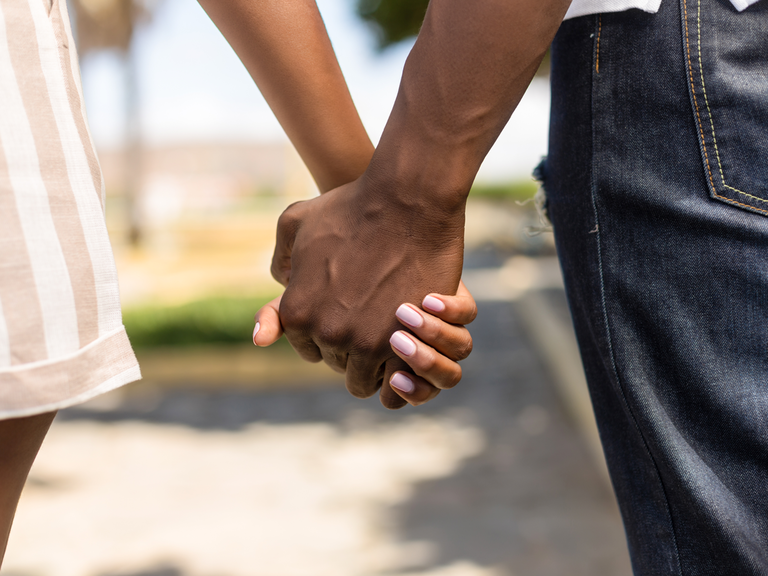Being Passive Aggressive Is Hurting Your Relationship—Here's How to Avoid the Behavior

Despite the love you and your partner have for each other, conflict is inevitable. There will be times when you disagree with each other (whether they're related to wedding planning or not). But what matters most is how you handle the conflict. And if you're in a passive aggressive relationship, you could be causing more harm to your relationship than you realize.
People who display passive aggressive behavior often struggle with expressing their feelings directly. Instead, they suppress their negative emotions (normally out of a fear of conflict) and don't express anger—instead projecting them onto others (in this case, their partner). The problem with this behavior is that it does little to resolve the situation. In fact, it can often make things worse. That's because your loved one may not fully understand the issue, forcing them to mind-read or to guess. And every wrong move could lead to more hurt, more confusion and more conflict. Another con? Passive aggressive behavior in a relationship can cause feelings of loneliness and isolation.
If you've found yourself wondering, "Am I in a passive aggressive relationship?" then you're already on your way to staying mindful and intentional about your actions in your relationship. To help make your relationship stronger, we spoke to experts about passive aggressive behavior—from what it is to how to avoid it. Read their advice, below.
What exactly does passive aggressive mean?
You've likely heard the phrase "passive aggressive," but what exactly does it mean? "Passive aggressive is an unhealthy type of communication style or behavior pattern," explains Landis Bejar, a New-York based licensed mental health counselor and founder of AisleTalk, a counseling service for couples. "It means you have something (usually negative) to deal with and you are being avoidant (passive) about what you really need but aggressive about something else—either your tone is aggressive or you're being aggressive about something that isn't really the heart of what you are trying to communicate." Sarcasm, silent treatment and withholding information are all signs of passive aggressive behavior.
What is passive aggressive behavior in a relationship?
Despite containing the word "aggressive," passive aggressive behavior isn't always as aggressive as you might imagine. That's because of the passive nature that accompanies it. "Passive aggressiveness can often come in different forms—sarcasm is a very common way of being passive aggressive," Bejar says. "Other forms include misdirected anger or aggression, backhanded compliments or testing your partner to see how they will react or respond to something."
Other forms of passive aggressive behavior involve even less communication (think: cold shoulder or sulking). "Passive aggressive behaviors in a relationship include stonewalling or giving a partner the silent treatment, making excuses for inaction, withholding important information, pretending you are just kidding and stalling," says Jean Fitzpatrick, licensed psychoanalyst and a relationship therapist and premarital counselor in New York. "Often the person who uses passive or indirect aggression has a way of inciting a partner to anger without taking responsibility for his or her role in that."
What are some effects of a passive aggressive relationship?
So you know what passive aggressive behavior looks like, but do you know how it can affect your relationship? "Passive aggressive behavior is confusing, ineffective, and, when used regularly, damaging to a relationship," Bejar says.
It Can Lead to More Conflict
"When your communication is passive aggressive, rather than direct, your partner won't know what you want—you'll be putting them in a position to 'mindread,' which is a big no-no in a healthy relationship," Bejar says. "If your partner misses your 'clue' to mindread, or they read inaccurately, you are setting your partner (and therefore your relationship) up to fail."
Not only can passive aggressive lead to more negative feelings, it can prolong your disagreements too. "You may find you're focusing on their being an obstacle to moving forward, or even wondering whether you're overreacting," Fitzpatrick says.
It Can Cause Feelings of Loneliness
The lack of direct communication can also cause feelings of loneliness in your relationship, as neither member of the couple feels understood. That's because the message of what you're feeling or needing gets lost in the delivery when you're acting in a passive aggressive manner. "Every time a couple has to communicate is an opportunity for connection and shared experience—even when the content of what's being communicated is heavy or difficult," Bejar says. "When you regularly behave passive aggressively rather than using direct communication, you isolate yourself and drive a wedge between you and your partner."
How Not to Be Passive Aggressive in Your Relationship
If you're a passive aggressive person (or simply have passive aggressive tendencies during disagreements), here are four expert tips on how to avoid the behavior and handle conflict in a healthy way. Psst: This info is helpful if you have a passive aggressive partner and are on the receiving end of their actions too.
Take Time to Self-Reflect
Often, someone who displays passive aggressive behavior may not even what they're doing. That's why Bejar encourages self-reflection. "We might not realize we are procrastinating on a task because we don't like how it was asked of us," she says. "Or a backhanded compliment might just come out of us automatically without really realizing the underlying sentiment behind it. We might not even connect the behavior with our true feelings right away, so spend some time getting in touch with that."
Once you've identified what your expression of anger looks like address which feelings they're attached to. "If you acknowledge them for yourself, you will have a better chance of communicating directly and respectfully," Bejar says. "If you avoid or dismiss your own feelings, you risk behaving passive aggressively—either intentionally or sometimes without even realizing it."
Get to the Root of Your Feelings
Now that you've acknowledged your feelings, it's time to dig a little deeper. "If this is a pattern for you, get in touch with why it might be difficult for you to communicate your feelings more directly," Bejar says. "Maybe you never had that modeled for you at home and you don't know anything but passive aggressive communication." Or, maybe you don't want your partner to see you as sad,vulnerable or angry. "Sometimes understanding the 'why' can help us change and move forward," Bejar. Individual therapy, psychiatry or couples counseling is a great place to work on this.
Don't Expect Your Partner to Read Your Mind
If you've been with your partner for a while, it's easy to expect them to know what you're thinking. After all, they know you so well—shouldn't they already know what's on your mind? Sadly, the answer is no. Even after years of dating, they aren't able to read your mind. And expecting them to will only cause more conflict. "Unlearn old relationship myths like 'If my partner really loves me, they should know what I want without my having to ask,'" Bejar says. "This is just plain wrong, and it sets couples up for failure."
Use Direct, Assertive Communication
When the time comes to communicate, use direct or assertive communication. "Direct communication is the only healthy type of communication," Bejar says. "It communicates your needs and feelings clearly, openly, and honestly, giving your partner the best possible chance to meet them."
But how exactly do you communicate directly without being aggressive? "Lead with how you are feeling," Bejar says. "Avoid labeling your partner's feelings or personal experience, and ask them—respectfully—how you'd like things to be different." Not only will it save you both a lot of time, it will also save you both from hurt feelings. Remember: Conflict is an opportunity to grow stronger together. Prioritize your well-being (and your partner's) and communicate honestly. Your relationship will be better for it.























